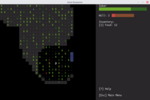Look to Windward by Iain M. Banks
book, review, science-fiction
This review was originally posted at Goodreads and imported here later with next to no spell/grammar checking.
5/5 stars
Reading Banks' books is always difficult for me. My puny brain can generally handle 2-3 easy-to-remember characters with a straightforward plot line or two. Banks on the other hand is happy to invent names with only the most tenuous connection to current human languages (this makes perfect sense in the fiction to be fair), joyfully weaving multiple parallel plots and timelines with seemingly nothing in common, interspersed by flashbacks. I love Banks but oh muh brane it hurt!
So when I say Look to Windward was straightforward to read, it is within the context of his other books.
This is the seventh book in the Culture series, so expect sci-fi, superhuman artificial intelligences, various alien species (including super fascinating non humanoid ones), fantastic worlds, spaceships, a bit of (mercifully brief this time) gore and a ton of things to think about.
Since the Culture books are super loosely connected, you’re free to read them in any order you wish and you could do much worse than starting with this one.
You would miss the nod to GCU Grey Area and one of the most wonderful scenes I came across (two Culture citizens sharing ship names they came across — blatant fan service but also absolutely obviously wonderfully a thing some people in Culture do), but that’s about it.
The story is self-contained, the characters appear in this book only. And it’s a great ride. Especially towards the end when it all started to come together, along with an ending I absolutely did not expect.
I liked the characters, including the antagonist (a thing almost unheard of in the storytelling I came across) and this is I believe the first time I’ve teared up about a textual description of a symphony (yep, musical symphony).
Oh also a fascinating take on religious doctrine, afterlife and reincarnation in a society where saving someone’s mind state and running it in a computational substrate or a new body is technologically feasible.
All in all an excellent book with a lot of weird stuff you probable never thought of, but isn’t that what sci-fi is (supposed to be) great at?
If there is one thing I have misgivings about, it would be the epilogue. While interesting, it felt a little bit too neat, too on the nose. It seemed quite unnecessary while adding only very little. But that’s the tiniest of quibbles.
It’s a fantastic book at it in no way obligates you to read the rest of the series.
